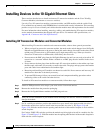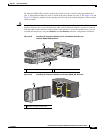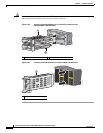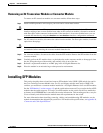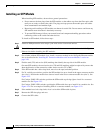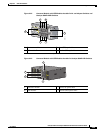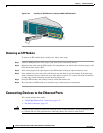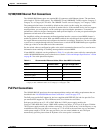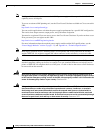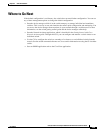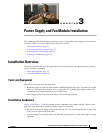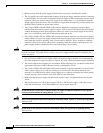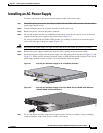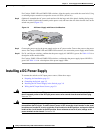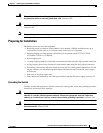
2-28
Catalyst 3750-E and Catalyst 3560-E Switch Hardware Installation Guide
OL-9774-03
Chapter 2 Switch Installation
Connecting Devices to the Ethernet Ports
Note On 48-port PoE switches, you must use the 1150-W power-supply module to provide full 15.4-W
capability across all 48 ports.
To access an advanced PoE planning tool, use the Cisco Power Calculator available on Cisco.com at this
URL:
http://tools.cisco.com/cpc/launch.jsp
You can use this application to calculate the power supply requirements for a specific PoE configuration.
The results show output current, output power, and system heat dissipation.
You must be a registered Cisco.com user to access the Cisco Power Calculator. If you do not have a user
ID or password, you can register at this URL:
http://tools.cisco.com/RPF/register/register.do
For more information about the required power-supply module and the PoE specifications, see the
“Power-Supply Modules” section on page 1-15, and Appendix A, “Technical Specifications.”
Note Many legacy powered devices, including older Cisco IP phones and access points that do not fully
support IEEE 802.3af, might not support PoE when connected to the switches by a crossover cable.
Caution PoE faults are caused when noncompliant cabling or powered devices are connected to a PoE port. Only
standard-compliant cabling can be used to connect Cisco pre-standard IP Phones and wireless access
points or IEEE
802.3af-compliant devices to PoE ports. A cable or device that causes a PoE fault must
be removed from the network.
Warning
Voice over IP (VoIP) service and the emergency calling service do not function if power fails or is
disrupted. After power is restored, you might have to reset or reconfigure equipment to regain access
to VoIP and the emergency calling service. In the USA, this emergency number is 911. You need to be
aware of the emergency number in your country.
Statement 361
Warning
Voltages that present a shock hazard may exist on Power over Ethernet (PoE) circuits if
interconnections are made using uninsulated exposed metal contacts, conductors, or terminals.
Avoid using such interconnection methods, unless the exposed metal parts are located within a
restricted access location and users and service people who are authorized within the restricted
access location are made aware of the hazard. A restricted access area can be accessed only through
the use of a special tool, lock and key or other means of security.
Statement 1072



